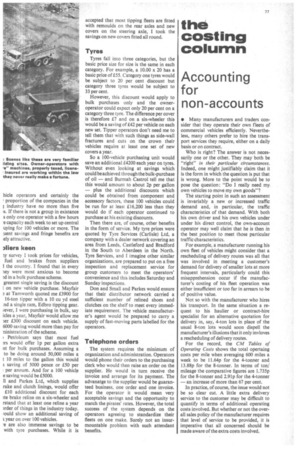the costing column Accounting for non-accounts
Page 79

If you've noticed an error in this article please click here to report it so we can fix it.
• Many manufacturers and traders consider that they operate their own fleets of commercial vehicles efficiently. Nevertheless, many others prefer to hire the transport services they require, either on a daily basis or on contract.
Who is right? The answer is not necessarily one or the other. They may both be "right" in their particular circumstances. Indeed, one might justifiably claim that it is the form in which the question is put that is wrong. More to the point would be to pose the question : "Do I really need my own vehicles to move my own goods"?
The starting point in such an assessment is invariably a new or increased traffic demand and, in particular, the traffic characteristics of that demand. With both his own driver and his own vehicles under under his direct control, the own-account operator may well claim that he is then in the best position to meet those particular traffic characteristics.
For example, a manufacturer running his own fleet of vehicles might consider that a rescheduling of delivery routes was all that was involved in meeting a customer's demand for delivery of smaller lots at more frequent intervals, particularly could this misapprehension occur if the manufacturer's costing of his fleet operation was either insufficient or too far in arrears to be of positive value, Not so with the manufacturer who hires his transport. In the same situation a request to his haulier or contract-hire specialist for an alternative quotation for delivery in, say, 4-ton lots in place of the usual 8-ton lots would soon dispell the manufacturer's illusions that it only invloves a rescheduling of delivery routes.
For the record, the CM Tables of Operating Costs shows the total opertaing costs per mile when averaging 600 miles a week to be 11.64p for the 4-tonner and 13.88p for the 8-tonner, In terms of ton/ mileage the comparative figures are 1.735p for the 8-tonner and 2.91p for the 4-tonner — an increase of more than 67 per cent.
In practice, of course, the issue would not be so clear cut. A little extra delivery service to the customer may be difficult to quantify in terms of additional operating costs involved. But whether or not the overall sales policy of the manufacturer requires that level of service to be provided, it is imperative that all concerned should be made aware of the extra costs involved.




















































































































































